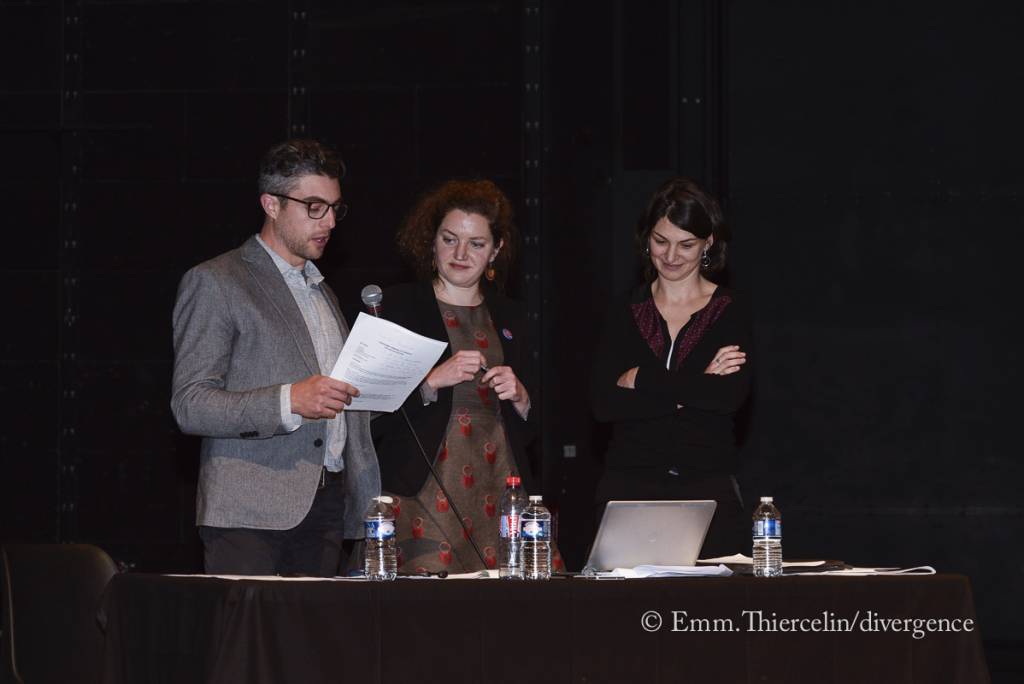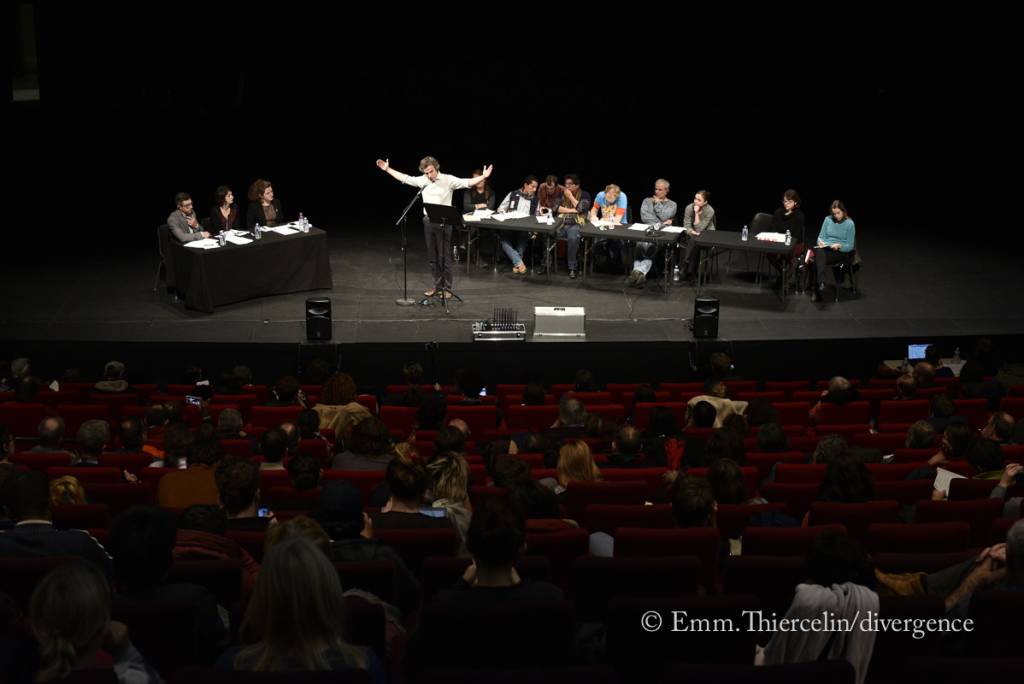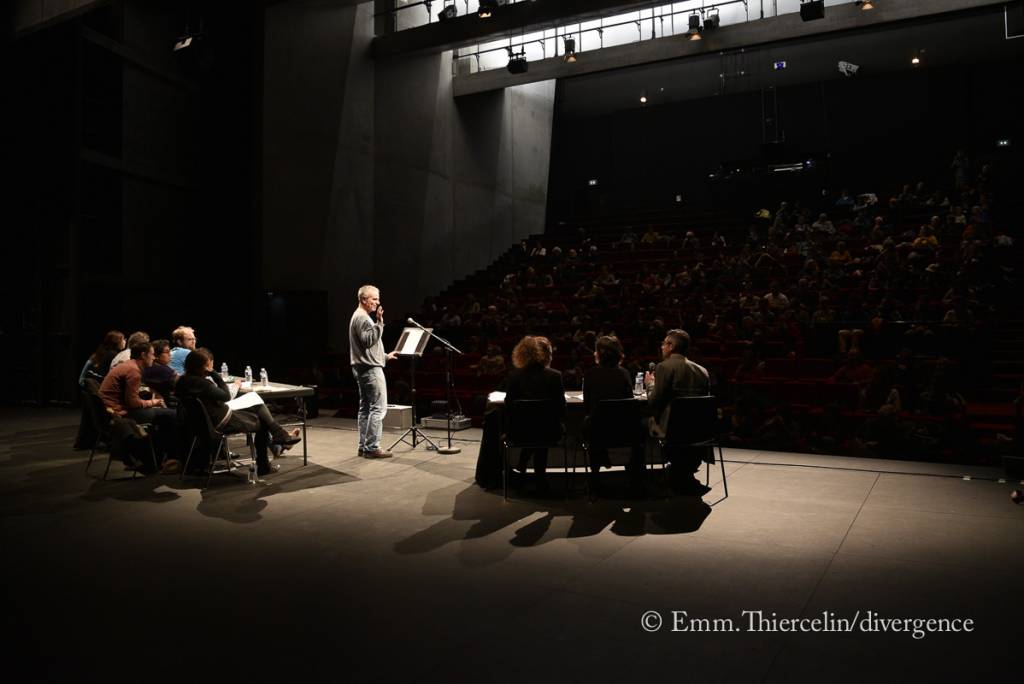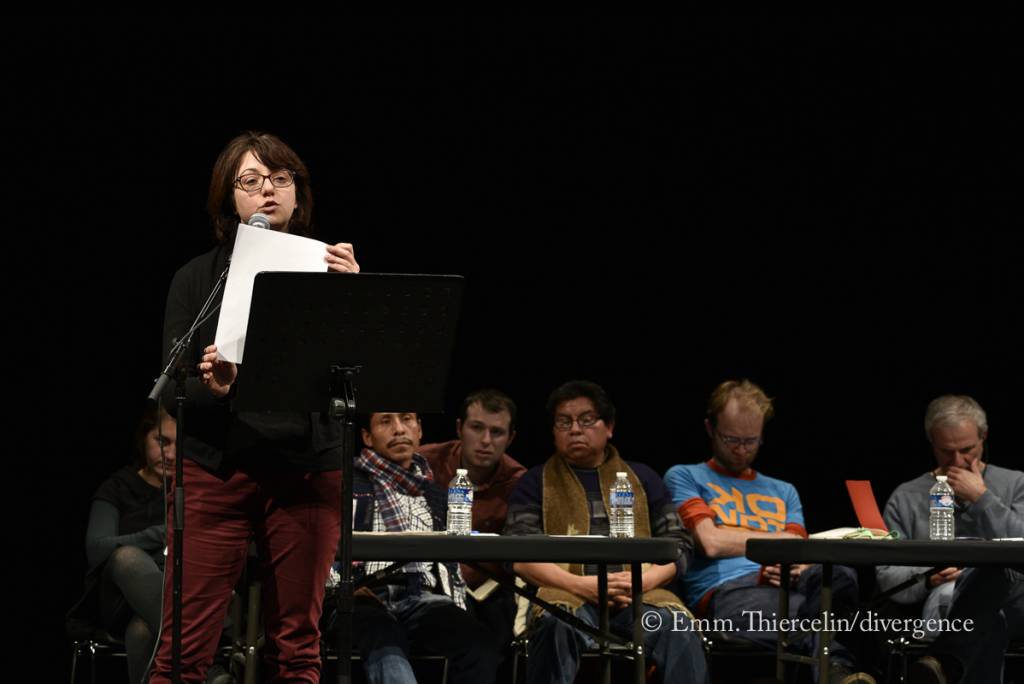PARIS — On international Human Rights day, and ahead of the ‘One Planet’ climate finance summit hosted by President Macron, a coalition of NGOs (1) put the fossil fuel industry and those that finance it on trial – demanding that not a penny more of public money is spent on fossil fuel production.
Testimonials of people affected by the devastating consequences of the fossil fuel industry as well as climate change were presented at the Nouveau Théâtre de Montreuil (Paris), to a panel of three judges and a room of 350 witnesses.
The hearings were presided over by three judges: Brett Fleishman, senior finance campaigner for 350.org; Aurélie Trouvé the co-president of the french branch of ‘Attac’, an international movement working towards social, environmental and democratic alternatives, and Marie Toussaint President of ‘Notre affaire à tous’ an organisation that specialises in using law as an advocacy tool to protect the environment and the climate. The judges unanimously condemned the continued financial support of investments in coal, oil, gas and nuclear, the energy sources of the past that continue to wreak havoc on the environment and the communities where these investments are made:
“We accuse the public and private financial sectors of violating fundamental rights, we accuse states of violating international treaties, failing to fulfill their obligations to respect and protect the rights of people and commons across the planet. We recall that more than 200 environmental defenders were killed in 2016 worldwide. The sentence we pronounce is international. In Africa, Europe, Asia, the United States and the Pacific, people will rise to turn this crisis into a just transition”, they sentenced.

Tribunal Finances&climat au Nouveau Thatre de Montreuil.
During the mock-tribunal witnesses presented first hand accounts of the destructive effects coal, oil and gas have had and continue to have on communities from around the world. Testimonials were provided by representatives from: Notre-Dame-Des Landes (France), the Sundarbans (Bangladesh), Hambach forest (Germany), the Overseas territories of France, among fifteen others.
Two years after COP21, we are seeing impacts increase in France where Macron intends to present himself as a climate champion tomorrow. According to Philippe Assens, winegrower near Perpignan, “We are currently experiencing a major climate disaster in the form of an intense drought that has lasted for 3 years. All streams are dry, the cellars are in bankruptcy; in the 2016 harvest alone we lost 15 million bottles. But what is the French government doing to help us? They are planning to build a gigantic pipeline under my wineyard, the MidCat pipeline: these pipelines are the cause of our dire situation today, and they will make our children worse off tomorrow.”

Tribunal Finances&climat au Nouveau Thatre de Montreuil.
The evidence presented during the trial gave the stark reality of the consequences of these investments, which could have gone instead into renewable energy, and support the communities most impacted by climate change.
“The witnesses made the case that money in one part of the world is often linked to infrastructure projects being built elsewhere, also that the dirty energy projects in one part of the world are creating devastating environmental impacts the other side of the planet. France wants to champion climate finance, but we just found out that its investment arm, the Caisse des Dépôts et Consignation, is financing twelve carbon bombs around the world, and that the French Agency of Development is actually financing two coal power plants : one in China, the other in Senegal,” said Clémence Dubois, campaigner for 350.org in France.
Finance institutions, especially those acting in the public interest, cannot continue to fund fossil fuels. On this Human Rights day, Yossi Cadan, senior campaigner for 350.org based in Canada highlights the following: “Environmental racism is a reality of Canadian development projects and with tar sands in particular. The Assembly of First Nations reported in 2001 that 36% of all First Nation communities lived within 50 km of mining developments and associated pollution zones. As such, the battle over the tar sands mining comes down to the fundamental right to exist as Indigenous peoples. The tar sands are a human rights issue.”

Tribunal Finances&climat au Nouveau Thatre de Montreuil.
Tomorrow on the 12th of December, heads of state will meet in Paris to talk about how investments can be made “green again”. But at the same time, the European Investment Bank board of directors will meet in Luxembourg to decide whether or not to approve a EUR1.5 billion loan for financing the TAP pipeline. “The Trans-Adriatic Pipeline was portrayed to us as just a pipe, that would have brought development and wealth. Instead, what we see today on the horizon is an extremely impacting and harmful mega infrastructure project. Approving such a huge loan would be a reckless act, which would prove once again the incoherence between European leaders rhetoric and policies when it comes to climate change. To stop climate change, we need to stop investing into fossil fuels, now. Even at this stage, when the real construction works have yet to begin, TAP has already caused great harm to our land. The entire area of San Basilio, where my kids have grown playing around centuries-old olive trees, nearby one of the most beautiful beach in Italy, has been turned into a unwelcoming desert, surrounded by concrete, fences and Barbed-wire. We reject this system, that exploit our land and lives,” said Serena Fiorentino from the No-TAP movement opposing the pipeline.

Tribunal Finances&climat au Nouveau Thatre de Montreuil.
It is time for the community of global economic actors to step up its efforts to save our planet and preserve our common future. Macron and other world leaders have a chance during the summit to finally start delivering on the promises made in the Paris agreement: simply put, there is no more room for new fossil fuel infrastructure and therefore no case for ongoing investment.
###
CONTACTS:
Clemence Dubois, France Campaigner, 350.org [email protected]; Whatsapp/Mobile: +33642713175
Hoda Baraka, Global Communications Director, 350.org [email protected]; whatsapp: 20-100-184-0990; Mobile (in Paris): +33687064247
NOTES:
- Groups participating in the trial include 350 France, Alternatiba, Friends of the Earth France, ANV Nonviolent Action COP21, Attac France, Bizi Mugi, Common Water Coordination France, the Water Coordination Ile de France, the CRID, the Climate Action Network, the Foundation for Nature and Man, Oxfam France, the Refedd, Sciences-Po Zero Fossils and ZEA.